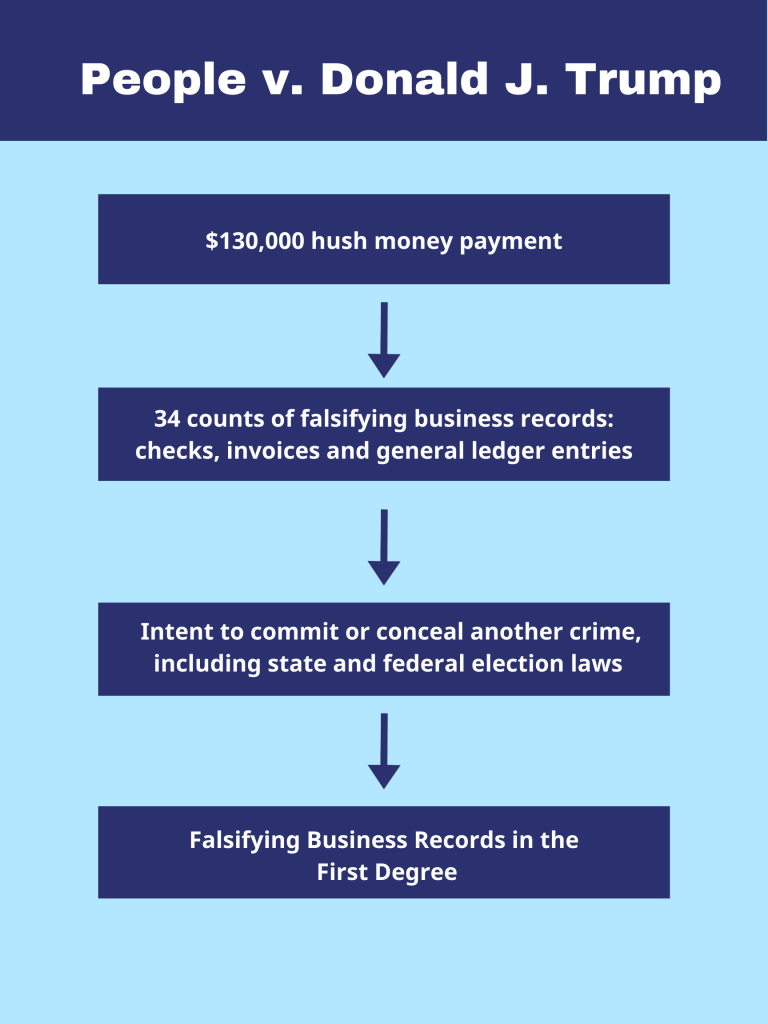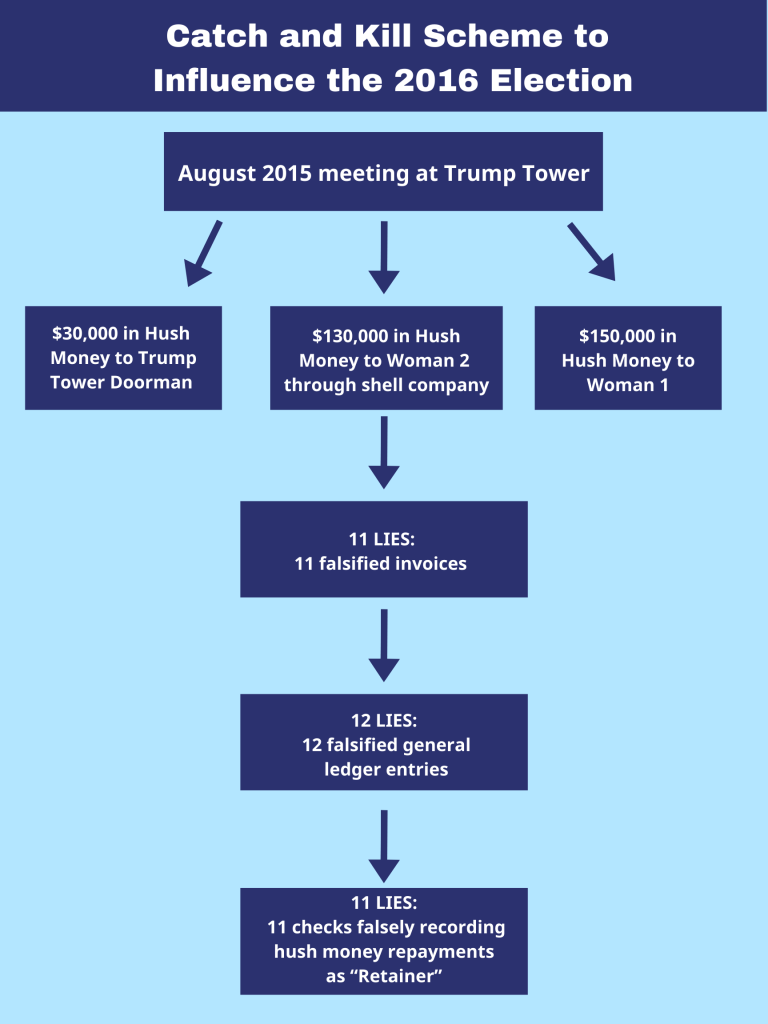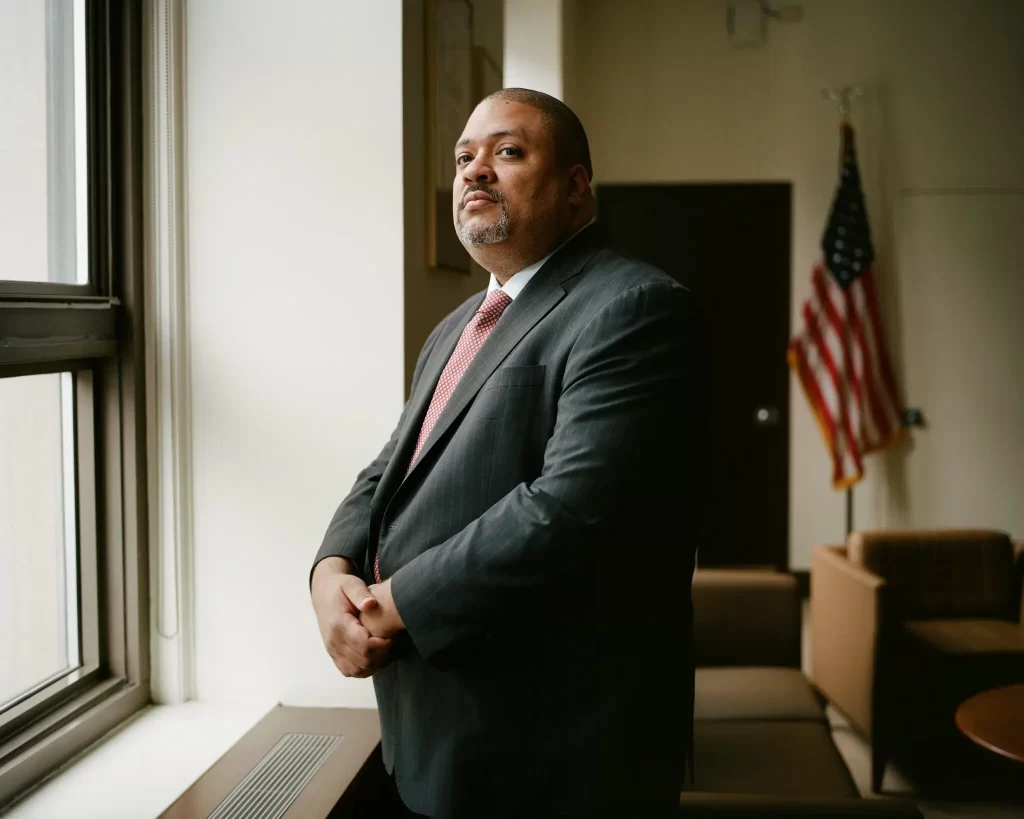Section I: Political Watch & White Collar Crimes
Article 1. The Indictment of a President – featured story
We all now know that former President Donald Trump was indicted by a Grand Jury in the New York Supreme Court on April 4, 2023. He is charged with 34 counts of Falsifying Business Records in the First Degree. The business records were allegedly falsified to conceal damaging information and unlawful activity from American voters before and after the 2016 election. According to the Indictment, Trump and others used a “catch and kill” scheme to identify, purchase, and bury negative information about him and boost his electoral prospects. The Indictment was brought to the Grand Jury by Manhattan District Attorney Alvin L. Bragg, Jr.
The Indictment as Outlined by New York District Attorney’s Office


“The People of the State of New York allege that Donald J. Trump repeatedly and fraudulently falsified New York business records to conceal crimes that hid damaging information from the voting public during the 2016 presidential election,” said District Attorney Bragg. “Manhattan is home to the country’s most significant business market. We cannot allow New York businesses to manipulate their records to cover up criminal conduct. As the Statement of Facts describes, the trail of money and lies exposes a pattern that, the People allege, violates one of New York’s basic and fundamental business laws. As this office has done time and time again, we today uphold our solemn responsibility to ensure that everyone stands equal before the law.”

According to court documents and statements made on the record, “from August 2015 to December 2017, Trump arranged his “catch and kill” scheme through a series of payments that he then concealed through months of false business entries.
On one occasion, American Media Inc. (“AMI”), paid $30,000 to a former Trump Tower doorman, who alleged to have a story about a child Trump had out of wedlock.
In a second instance, AMI paid $150,000 to a woman who alleged she had a sexual relationship with Trump. When Trump explicitly directed a lawyer who then worked for the Trump Organization as Trump’s Special Counsel (“Special Counsel”) to reimburse AMI in cash, the Special Counsel indicated to Trump that the payment should be made by way of a shell company and not by cash. AMI ultimately declined to accept reimbursement after consulting their attorney. AMI later admitted its conduct was unlawful. In an agreement with federal prosecutors, AMI agreed it made false entries in its business records and revealed the true purpose of the $150,000 payment.
In a third instance, just 12 days before the presidential general election, the Special Counsel wired $130,000 to an attorney for an adult film actress. The Special Counsel, who has since pleaded guilty and served time in prison for making the illegal campaign contribution, made the payment through a shell corporation funded through a bank in Manhattan.
After winning the election, Trump reimbursed the Special Counsel through a series of monthly checks. The first of these checks were from the Donald J. Trump Revocable Trust. This Trust was created in New York to hold the Trump’s Organization’s assets during Trump’s presidency. Later, payments were made from Trump’s bank account. All in all, 11 checks were issued for a phony purpose. Trump signed nine of those checks. Each check was processed by the Trump Organization. The checks were illegally disguised as a payment for legal services rendered pursuant to a non-existent retainer agreement. In total, 34 false entries were made in New York business records to conceal the initial covert $130,000 payment. The true nature of the reimbursements were mischaracterized by participants in the scheme “for tax purposes.”
The above is just a summation of facts as outlined by DA Bragg’s Office. It is a summation of the Indictment and the Statement of Facts by his office.

Because this new territory for our country, we don’t know what the outcome will be. I am sure that four (4) years from now, we will say, “remember when.” What has occurred, is that the indictment of former President Trump has energized the former president’s supporters. As they get behind the former president, erosion of trust in our legal system exacerbates and national divisions increase. The country continues to sit on a powder keg that could make January 6, 2021 look like a small frat party.
Alex Conan, a Republican consultant, who led communications for Senator Marco Rubio’s 2016 presidential campaign told the media, “People have such strong feelings about Trump, it can’t help inflame divisions…There’s just no common ground on anything involving Trump.”
Everyone must be brought before a court of law if they are accused of breaking the law. We must keep in mind that former President Trump is innocent until proven guilty. As we always said in our criminal justice classes, “an indictment is not a conviction.” In order to be found guilty, you must either plead guilty or be found guilty of a crime. Either way, we, as U.S. citizens, are entitled to our day in court. Let’s just leave it at that.
– sources- District Attorney’s Office for New York County, Press Release, Cable News Network (CNN), and Wall Street Journal
Section II: The Drug Corner
Article 1. Fentanyl Penalties for Alabama
Alabama lawmakers approved a bill for harsher penalties for trafficking in fentanyl. The penalties go up as high as life imprisonment. The Alabama Senate approved the bill, that was passed by the House, in a vote of 31-0. The vote came without debate. The bill was signed by Governor Kay Ivey.
Like previous laws involving trafficking in drugs, the law sets mandatory minimum sentences for fentanyl trafficking based upon weight. The law now requires a mandatory minimum sentence of three years for possession of one to two grams of fentanyl, ten years for possession between two and four grams, 25 years for possession of four to eight grams and life in prison for possession of more than eight grams.
Fentanyl is a synthetic opioid drug that is often mixed with other drugs, to include: methamphetamine, cocaine, and other pain medication. So, in order to count the amount of fentanyl a person possessed, it must be separated out from the other components (drugs), a task that is not easy to do. Also, an extraction of a fentanyl from a pill made with multiple drugs can cause legal arguments for defense counsel. Especially if their client is facing life imprisonment for 8 grams.
According to Governor Ivey, “The entire nation should take note of what we accomplished today in Alabama with the passage of House Bill 1, the bill to help combat the fentanyl crisis…Every member of the Legislature – Republican and Democrat – came together to pass this critical piece of legislation…Combatting this deadly drug will continue to be a top priority for our Alabama Law Enforcement Agency, and I will do everything in my power to stop this drug from being a killer in Alabama.”

In 2021, according to the Center for Disease Control and Prevention, synthetic opioids, primarily fentanyl, were responsible for killing more than 70,000 people. Yet, it is not considered a national epidemic.
– sources – Wall Street Journal and WSFA – Channel 12 News NBC
Section III: The Firearms Table
Article 1. Out of State Firearms for New York City and Baltimore Wreak Havoc
Out-of-state guns wreak far more havoc in New York City than in any other big city in America, federal data shows. From 2017 through 2021, 93% of the 12,910 guns recovered from crimes in the five boroughs were linked to an initial sale from outside the state, the federal Bureau of Alcohol, Tobacco, Firearms and Explosives (ATF) says. The city that has the distinction of being in second place is Baltimore with 61% of guns used in crimes to originate out of state. However, the is just not New York’s problem. As the data reveals, 28% of firearms nationwide recovered in crimes originated across state lines.
What is of interest to ATF is where these guns originated from. According to ATF, Southern states with lax gun laws are the most common source of firearms. Accordingly, Georgia was the source of 1,736 guns in New York crimes during the four-year study period. Another 1,677 guns used in crimes came from Virginia. South Carolina was in third place as the origin of 1,421 guns.
As a result of the recent round of mass shootings, President Biden ordered a gun trafficking analysis as part of its attempt to figure out how to best deal with firearm violence in general. According to ATF Director Steven Dettelbach, that is when these startling statistics came to light.
Dettelbach told participants at a Citizens Crime Commission breakfast in Manhattan earlier in April that he worries mass shootings and gun violence across the country will become acceptable.
“My biggest fear as a director, as a father, as a former prosecutor, a lawyer and an American is that somehow we’ll become numb to it — that we’ll kind of accept there’s nothing we can do about it and that…it’s part of somehow being an American,” Dettelbach said. “That would be a disaster if that happened.”
Dettelbach said the gun origin data should be used to build criminal cases that stop the flow of guns into the city. Many of the guns found in New York are brought there from ‘runners.’ The ‘runners’ buy the firearms in the south (in bulk) and drive them along Interstate 95. In fact, this is so common that law enforcement has called the system, the Iron Pipeline.
John DeVito, the special agent who runs ATF’s New York office, said he was not surprised by the 93% figure, given improved tracing methods that took effect in 2019 that cut down on the number of guns for which an original purchase cannot not be determined.
According to DeVito, New York has the nation’s strictest gun laws. The city of New York has a population with strong ties to the southern states. He is not surprised that the strong familial ties to the southern states make it an ideal black market. Also, DeVito says, “you can make a profit relatively easily.” In fact, criminal gangs can get more for black market firearms than drugs.
David Kennedy, a professor at the John Jay College of Criminal Justice, said five federal gun trafficking strike forces set up last year to combat the flow of guns from states with loose gun laws to states like New York with stricter rules are a significant step in dealing with the problem.
Kennedy sums it all up.
‘’Drug sales are not in and of themselves violent but we give that market an enormous amount of attention,” Kennedy said. “Historically, we’ve given the illicit market of firearms almost no attention. Happily, we’re starting to come back from that a little bit,” Kennedy added. “But there’s been decades of a lot of lost opportunity — and a lot of dead people.”
– source – New York Daily News – contributor – Rocco Parascandola
Section IV: Mental Health and Criminal Profiles
Article 1. Social Media Without Parental Consent is Now Illegal in Arkansas
This article was placed in Section IV (Mental Health and Criminal Profiles) because I really don’t know how to profile a teenager who innocently uses the internet as a criminal. On or about April 13, 2023, Arkansas became the first state to make it illegal for underaged children to be on social media without their parental consent. The bill, called Social Media Safety Act, or SB396, states the following:
“A social media company shall not permit an Arkansas user who is a minor to be an account holder on the social media company’s social medial platform unless the minor has the express consent of a parent or legal guardian…A social media company shall verify the age of an account holder. If an account holds is a minor, the social media company shall confirm that a minor has consent…to become a new account holder.”
The bill places the burden on the medial company to verify the age of any new user who lives in Arkansas, by obtaining a “digitized identification card, including a digital copy of a driver’s license…Government-issued identification; or any commercially reasonable age verification method.” Should a social media company fail to do this, it is subject to a $2,500 fine per violation, and also must pay for family legal fees if the family decides to sue.
However, like any piece of legislation in which is quickly passed to make “one feel good,” or that attempts to legislate morality, there are many issues yet resolved. For example, the bill does not apply to, “news or public interest broadcast, website video, report, or event,” any news-gathering organizations, any cloud service providers, or internet service providers who provide links to social medial platforms.
We shall shall see how this bill performs. Because of the vastness of the internet and social media, Arkansas will have its work cut out for them enforcing the parameters of such a complex law. They will have to answer questions like: which state agency will be responsible to enforce the law? if a parent later comes back and gives permission, is it still a crime? will there be instances of mitigating circumstances? of aggravating circumstances?
– source – Motherboard Tech by Vice
Leave a Reply